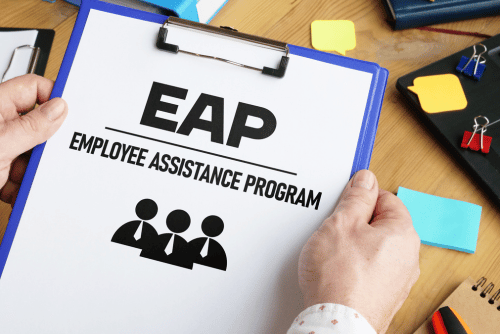
Blog
- Workplace Health & Safety
Home
Resources
Employee wellbeing

Kiran Virk, Head of Talent Acquisition
(Last updated )

Kiran Virk, Head of Talent Acquisition
(Last updated )
Your employee’s wellness and mental health is crucial for cultivating a positive work environment and maintaining productivity. While you may provide your staff with resources and support to do their job well, personal issues can affect performance in the workplace.
It is important that employers invest in the wellbeing of their staff to keep them engaged and to improve productivity and morale.
An Employee Assistance Program is an excellent way to help your employees who may be struggling with personal difficulties, such as stress, substance abuse, financial issues, poor mental health or family or marital problems.
An Employee Assistance Program is a short-term, confidential counselling service designed to help employees manage personal difficulties, which may be affecting their performance at work.
EAPs are paid for by employers and usually extend to members of the employee’s immediate family as well.
Your employees can reach out to EAP counsellors for support in areas such as:
Once you sign up with an EAP provider, your employees can contact them for assistance. Any benefits your staff or their families receive (counselling, advice, resources, referrals to other agencies or professionals for specialized or long-term support) are kept confidential.
Typically, your employees can avail of the service 24/7 and connect with professional counsellors online and/or via telephone.
A well-designed EAP is a win-win deal. It provides your staff (and their immediate family) with free, unlimited, quick, and round-the-clock access to professional counselling. The confidentiality is a big plus as well.
Investment in your staff’s mental and physical wellbeing is ultimately beneficial for your business. EAP counselling and support helps employees manage personal issues. It improves employee engagement, morale, and productivity.
EAP support reduces workplace conflict, absenteeism and presenteeism. In the long-term, it helps you develop a healthy work environment that attracts and retains talented individuals.
There are three types of EAP referrals:
Self-referral: When the employee decides to contact the EAP provider for assistance on their own.
Informal referral: When a manager, colleague or friend recommends the EAP to the employee. No record is made of the first two kinds of referrals in the employee’s file.
Formal referral: The reporting manager may refer the EAP based on the employee’s job performance. It may reflect in the records if there is a need for formal disciplinary action. The conversations with the counsellor, however, are still private and confidential. The employer has no knowledge of what transpires in the sessions.
There are numerous EAP services available. It is important that you select one that suits the needs of your business and staff.
A few things to keep in mind:
Consider what kind of EAP delivery model would work for your business. EAP costs are typically based on either usage of service or a fixed fee (per employee per month or year).
Make sure you are complying with all your legal obligations when selecting an EAP provider and putting a program in place.
Ensure your EAP provider sends you quarterly or annual usage reports. This will help you assess if your staff (their identities won’t be revealed to you) is benefitting from the program. Also, request for overall user satisfaction reports.
Ensure that you communicate your company’s EAP program, its benefits and confidentiality to all your employees. You may want to provide all such details about your EAP in your employee handbook.
Our experts can help you develop company policies and any other HR, health and safety, or employment advice you need. Our services can help you improve business practices, improve employee productivity, and increase profits. To learn more about how our services can benefit your business, call an expert today at 1 (833) 247-3652.
Home
Resources
Employee wellbeing
Find out what 6,500+ businesses across Canada have already discovered. Get round-the-clock HR and health & safety support with Peninsula.
